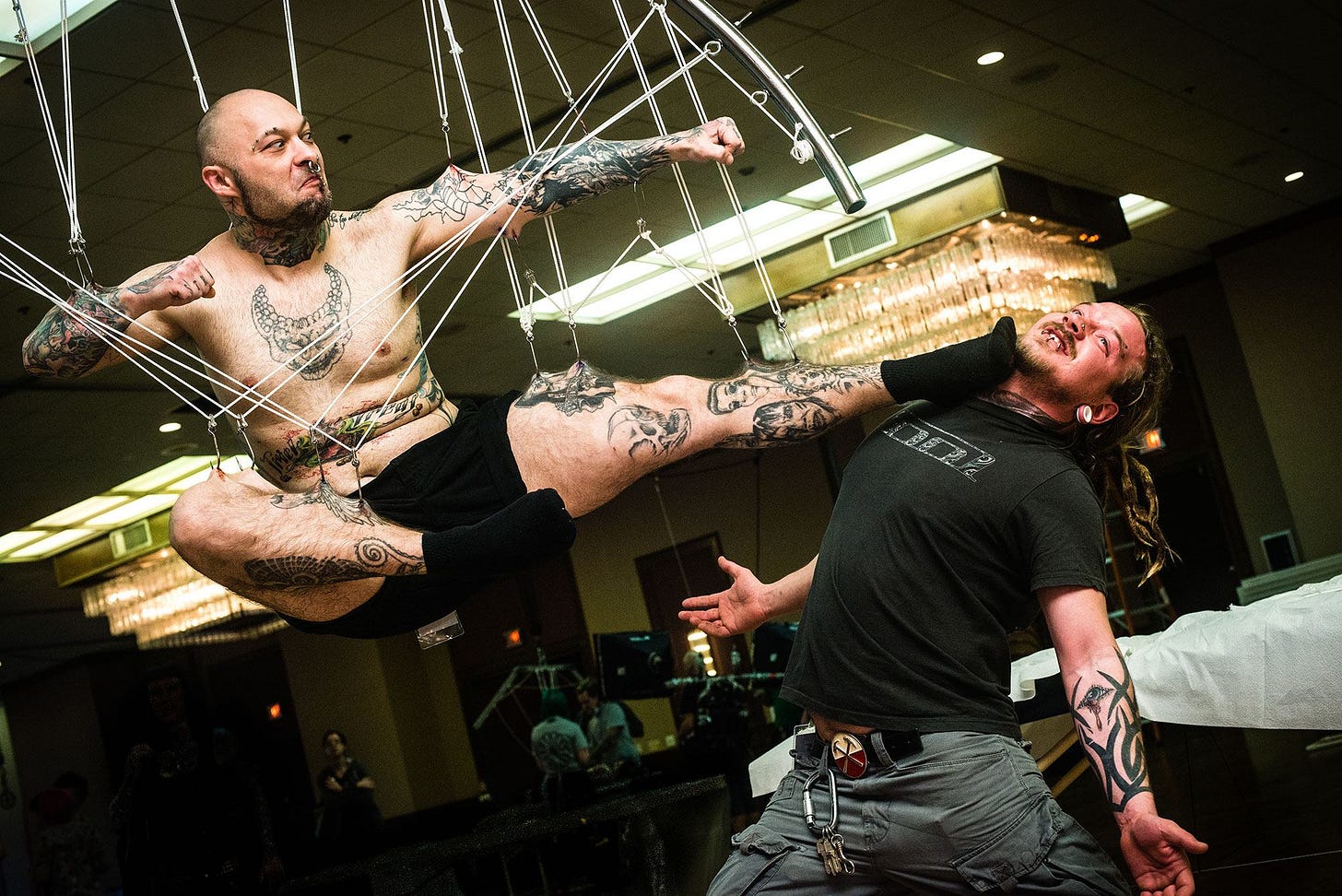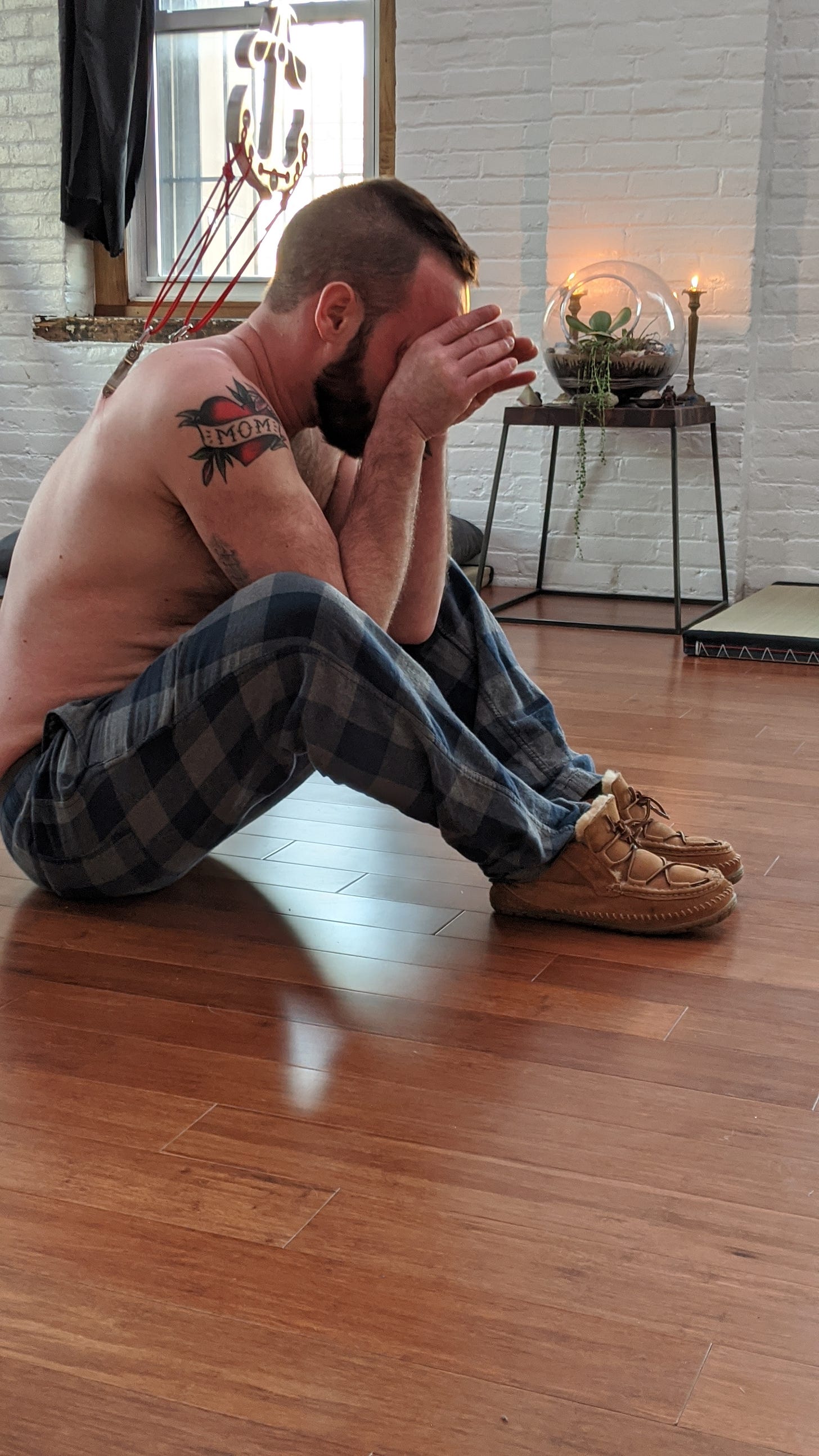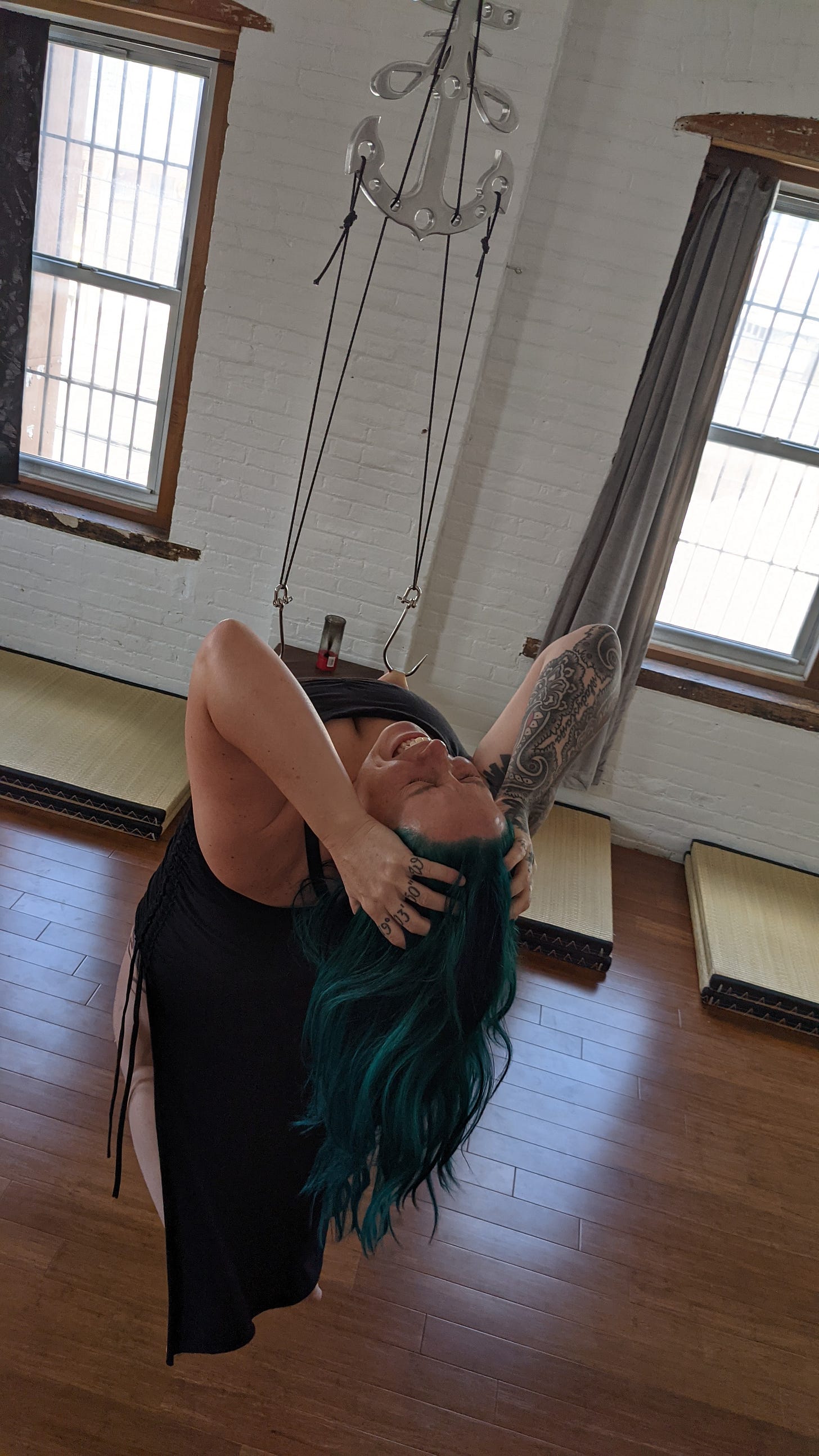Big Exhales
Carrying and releasing grief
Grief
noun
deep sorrow, especially that caused by someone's death.
"she was overcome with grief"
Last night, at an artist talk and Q&A, Miles Greenberg touched on something that is a big part of what I do in my work with suspension, and that I rarely talk about: breathing. What do we take in when we inhale? What do we release when we exhale?
Both joy and sorrow find a lot of real estate in our lungs, when they settle into our bodies, almost always as unexpected guests. We invite Joy in openly, and allow it to push stress and sadness out in the form of laughter. We can laugh so hard we are left breathless, and we can breath easier when we feel the levity that comes with contentedness.
And Grief? Well Grief is an unwanted visitor, that burrows deep and settles in for a long time, slowly permeating many facets of our lives. It can be a massively uncomfortable part of the process of catharsis, which is ultimately a process of releasing and resolving emotions. Whether you are crying, frustrated, or even holding back tears, breathing becomes more and more difficult. Your muscles tense up involuntarily, and your mind begins racing, both demanding more and more oxygen, taxing your lungs beyond their limits.
Before I get deeper into this, I want to state very clearly that I don’t believe in Elisabeth Kübler-Ross’s “Five Stages of Grief.” I think this kind of psychobabble is utter horseshit, and it is a fucking travesty that some academics can compile, compartmentalize, and classify the human experience of sorrow and pain like a linearized taxonomy project. Just like with the art world, there are some privileged idiots at the top of a class ladder in some white tower, that have decided what is what for billions of humans that will inevitably have profane experiences like love, loss, and death.
Everybody grieves differently. Everybody goes through a mixture of different feelings differently, and in different order. Sure, we might all go through denial, anger, bargaining, depression, acceptance, but not necessarily in that order, and we are certainly not limited to these 5 “things” they say we experience during grieving. And to use a formula like this from a psychological standpoint also leads to labeling humans as neuro-divergent when they experience such things “out of order,” or even outside of that scope. Again, this is utter. fucking. horseshit.
The complexity of grief is inherent to anybody that has experienced it. Some folks experience it more often in their lifetimes, and some very little. It’s not a pissing contest, nobody is trying to grieve harder. Well, maybe some folks on social media are. I am greatly frustrated by how quick people are to write entire essays that look like eulogies for people that have just passed away. It’s good to get these feelings out by writing them, but maybe think about how that feels for those that were closest to those that have passed - they’re reeling and left speechless. Grief and mourning are not a 48 hour social media cycle.
Nobody knows how to process somebody’s passing. Even if it’s the 100th time it’s happening. You don’t get “better” at grieving; this notion is utter and complete bullshit. The best we can do, is identify some mechanisms for coping that help, and hope that they work for us the next time around we experience immense loss.
When you lose somebody dear to you, it feels like the air in the room has been sucked out. In the depths of sorrow and pain, it can feel like your chest is being crushed, and that you can’t gulp down enough air to breath properly. Exhaling can turn into a rolling shudder, as you gasp over and over again trying to fill the demands of your lungs, and involuntary muscle contractions.
This is a kind of pain most people do not talk about. Muscle pain, bone pain, flesh wounds, burns, etc are all scary to think about, but come with the comfort of knowing that they will heal. With the pain of despair, there is no guarantee of healing. When somebody you love leaves this world, it’s easy to say things will be okay, but the heart does not believe that. How can things be the same again, now that a singular entity’s life has been extinguished, and you will never hear their voice, or feel their warmth again?
Most folks will push all of that pain deep, deep down inside, and move on. The grief will come back, and manifest in other ways. I find that shitty social behavior is the most common outcome; folks will deflect this deep trauma of having lost somebody by treating others like they are not their equals. Another common response is a long term process of manipulating others by projecting their shortcomings on others. News break: this is what the vast majority of humanity does.
Some folks are less afraid to lean into, and explore this space. Ignore society’s suggestion that you have to be strong and stoic, and give into the sorrow and pain for a bit. Let yourself cry. Let your lungs lead you a little, and breath through bouts of what feels like a panic attack, and let the air carry you through a period of mourning. There is no proper way to do this, as we all deal with loss and death differently, but we do all share the commonality of being able to release our weight through our lungs.
Just exhale. Do it again, and again. Place your anger, sadness, and even memories of joy on your breath, and release it from your chest. Do it again and again.
Do it again and again, until you are able to breath without effort again.
My biggest inspiration for creating has often been loss. I simultaneously love, and absolutely fucking hate this about myself. Many artists experience similar things. Something must always be destroyed, to create something new, and we don’t always get to choose what that thing is, or if we have control over it.
For most artists, it happens on a very basic level: materials are consumed (destruction), to give life (creation) to something that represents an idea, feeling, or concept. Whether you’re burning electricity to render graphics, or you’re smearing petrochemical or organically sourced pigments across the skin of dead trees, you’re essentially creating something from the ashes of dead dinosaurs (oil) or sentient organics (flora & fauna).
And for some artists, there is a higher level sacrifice occurring, and it’s not always a happy ritual. Sometimes the precedent is somebody’s death: in grieving, we go through motions that lead to processing emotions, and oftentimes this leads to some epiphanies about our selves, our lives, or just the nature of the world around us. This is always fodder for the art cannon.
And sometimes, we don’t really reach any remote sense of clarity like that. It has been 11 years and change since my friend and mentor Arwem “Spliff” Rosa passed away, and I’m still processing his death. Before and after that I have lost countless loved ones, friends, and family members. Sometimes I feel like I’m sitting next to a pile of corpses, and it feels like I’ve been left behind, which makes me feel sad and alone. Other times, I feel like there is no good reason at all for all of these good folks being taken away from us, and I get angry that there is no reason to try and make sense of it.
And sometimes, I find that balance between entirely uncontrollable bouts of heaving sobs, and completely numb acceptance of the futility of it all - this is where all the deep work happens. This is an incredibly powerful state of calm solace, where I can regulate breathing, and it feels like I am in the calm eye of an uncontrollable storm that reaches out to infinity around me. I don’t think this defines who I am, but it certainly lets me coherently see who I am by being able to sort and organize my thoughts, and give them form through my mediums of creation.
Grief is a great teacher. If you can pay attention to its rhythms, you can discover many things about yourself between breaths. Eventually, you may land on a series of very long exhales that release some of the most crushing weight you have been carrying, and as you let that pain go, the next breaths you draw may fill you with motivation, and and inexplicable lucidity about what you have to do next.

Life is absolutely kicking my ass and I am trying to remember how to breath again, but my podcast with Griff drops tomorrow, and it’s definitely a great discussion that serves to remind artists to keep arting.









This hits really close. The timeline of grieving and how it shifts and changes. and how even when it’s not as acutely painful as it was at the beginning, it still is just grief.
Indeed. It takes a lifetime (and probably many more) to process the shit life throws at you. It is often times suffocating and remorseless in its existence.
Sometimes the hanged man (quite literally in this case) is the only recourse. To lean in and create something... Anything then let it fester and rot inside.
I (have to) believe that everything in our mental landscape is usefull in the right ammounts. Everything is a pigment from which we make our own living art. Less for the souless ultra rational "psycholodicks" to say, there is no wrong emotion, no wrong order.
Lately I've seen grief can be a ritual of honor and self sacrifice to something that had the courage to exist in this harsh landscape. That through the dark colors of pain and suffering there can be a highlight of deep appreciation for something that is more a part of you now that you can't touch it anymore.
Still, shit fucking sucks.